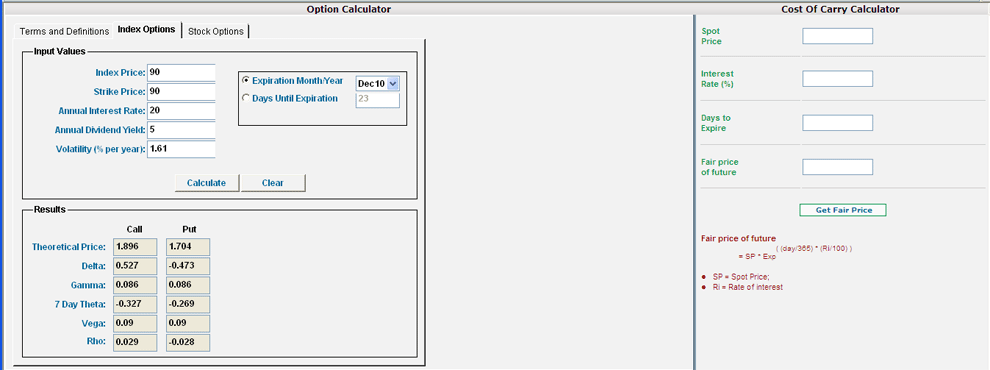Options Calculator
![]()
Option Calculator can be used to calculate the estimated value of option premium for a particular Options contract. Here, the user needs to specify certain parameters in the fields given in Options Calculator and press 'enter button' to calculate the option premium.
 |
How to calculate Options Premium for a particular contract?
Below are the steps given to calculate Options Premium:
- Reval date- To begin with, enter Reval Date. Reval Date is the date from which you want to calculate the option premium for the contract.
- Spot- Next, enter the current market price of the stock/index in the capital market.
- Pos size- Next, enter the lot size of the contract.
- Call/ Put- Next, choose whether the option is a Call option or a Put Option.
- American /European- Next, choose whether the option is a European Option or an American Option. A European option can only be exercised on the Expiry Date of the contract. While an American option can be exercised any time till the expiry of the contract.
- Exp. Date- Next, enter the Expiry Date of the contract.
- Strike price- Next, enter the Strike Price of the contract.
- Volatility- Next, enter the volatility for the particular stock expressed in percentage terms.
- Interest rate- Next, enter the Interest rate (in %) prevailing in the market currently.
Once you enter all the values mentioned above, press 'Enter' button on your keyboard to view the options premium for the given contract. It will be displayed in Price field.
What is an Option Price Chart?
The report also shows in a graphical format, how the price of the option will change as the price of the underlying varies. You can click on various radio buttons to view their respective chart patterns.
What are Delta, Gamma, Theta, Vega, Rho?
These are collectively called as "Greeks" and used to estimate the future value of the option contract as the market conditions change. Below is a brief description about them:
- Delta - Delta measures the sensitivity of option's theoretical value with change in the price of underlying asset. Its value varies between (-1) to (+1).
- Gamma - Gamma measures the rate of change in delta value with one point increase in the underlying asset. Its value is always positive.
- Theta - Theta is a measure of the rate of change in an option's theoretical value for a one-unit change in time to the option's expiration date.
- Vega - Vega is a measure of the rate of change in an option's theoretical value for a one-unit change in the volatility assumption. It is also known as Kappa.
- Rho - Rho is a measure of the expected change in an option's theoretical value for a 1 percent change in interest rates.
Also Read: